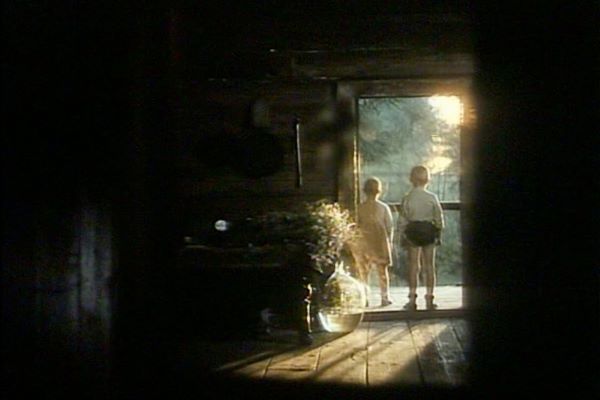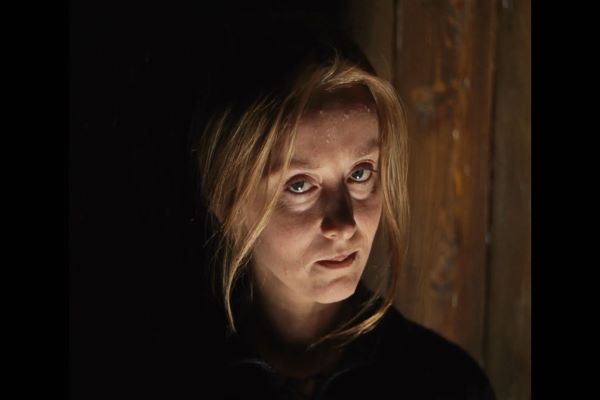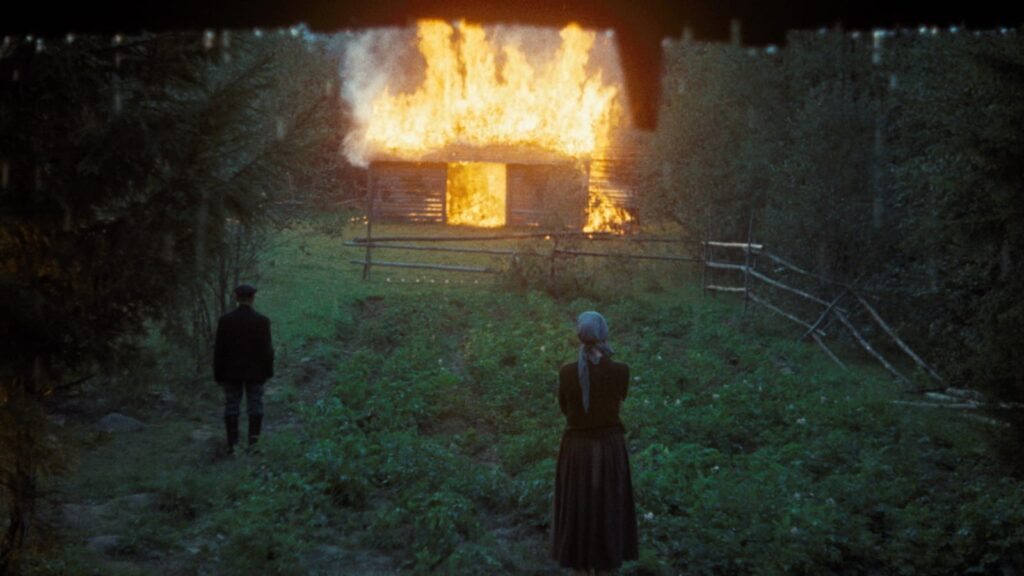Andrei Tarkovsky painted his life on the canvas of memories, dreams, and nostalgia in his deeply personal and autobiographical film Mirror. Tarkovsky’s Mirror is one of the most beautiful films ever made. The film lacks proper narrative structure and flows through three time periods in the life of the protagonist named Alexei (Filipp Yankovsky, Ignat Daniltsev, Innokenty Smoktunovsky-voice) who is the alter ego of the filmmaker himself. Those time periods are before World War 2, during the war, and after the war. Childhood is the most beautiful and precious phase of life, and it is not a surprise that it is colored by poetry, dreams, and imagination. In his autobiography “Sculpting in Time”, Tarkovsky mentioned – “What is this film about? It is about a Man. No, not the particular man whose voice we hear from behind the screen, played by Innokentiy Smoktunovsky.’ It’s a film about you, your father, your grandfather, about someone who will live after you and who is still “you”. About a Man who lives on the earth is a part of the earth and the earth is a part of him, about the fact that a man is answerable for his life both to the past and to the future. You have to watch this film simply, and listen to the music of Bach and the poems of Arseniy Tarkovsky; watch it as one watches the stars, or the sea, as one admires a landscape. There is no mathematical logic here, for it cannot explain what man is or what the meaning of his life is.”
Tarkovsky’s Mirror is set across three time periods – pre, post, and mid World War 2. The film does not follow any narrative structure and chronological order while flowing through the time periods. At the starting of the film, Alexei, who is an alter ego of Tarkovsky himself, is seen as a kid with his sister in his grandfather’s rural house. His father (Oleg Yankovsky) serves the Russian military and is away from home and family. His mother Maria (Margarita Terekhova) is seen waiting for his father sitting on a fence and smoking cigarettes. She has a brief chat with a doctor (Anatoly Solonitsyn) passing by and both of them fell down when the fence gets broken. The mystic beauty of the interior and exterior of the house is seen. Alexei, his mother, and his sister stand by and watch when the family barn is set on fire. In a dream sequence, Maria is seen washing her hair.

Now the time period changes to post-war and a telephonic conversation is heard between Alexei and his mother Maria. During the conversation, the interior of an apartment is seen but not Alexei. The time period again changes to pre-war. Maria is seen rushing to the printing press where she works as a proofreader. She assumes that she may have committed a mistake. Her colleague Liza at first comforts her and then insults her so badly that she breaks down in tears. The time period again changes to post-war. Alexei falls out with his divorced wife Natalia (Margarita Terekhova), who is living with their son Ignat (Ignat Daniltsev). A few newsreel footages of the Spanish Civil War and a USSR gas balloon from World War 2 are shown.
In the post-war time period, Ignat meets a mysterious woman who vanishes at Alexai’s apartment. During wartime, an adolescent Alexei is seen undergoing rifle training by an instructor at a military camp. A few newsreel footages from World War 2 including the Sino-Soviet Border Conflicts are shown. Now the time period again changes to pre-war when Maria visits her neighbor with Alexei where she slaughters a cock. Alexei and his sister reunite with their father at the end of World War 2. In a post-war sequence, Alexei again quarrels with Natalia. In a pre-war scene, the rural house and the surroundings are shown again. In a dream sequence, a levitating Maria is shown up in the air. Now the time period again changes to post-war and a frail Alexei is seen on his deathbed. He holds a bird and then releases it. In the last scene, Maria is seen pregnant and then old.
One of the most important characteristics of Tarkovsky’s films is capturing time through sounds and images of the surroundings where his characters dwell in. Those sounds and images bring back memories, dreams, and nostalgia. Through slow-motion tracks and pans, his meditative shots create a mystic and spiritual world. Using long takes, Tarkovsky captures the quintessential rhythms of time. His meditative camera slowly but continuously and smoothly moves through the spaces. With the passage of time, viewers very much become part of his mystic dream world. Mirror is like a piece of music that effortlessly traverses from one phase to another. Tarkovsky completely abandons a proper chronological order of the events and the time periods that continuously shift across pre, mid, and post-war. He invites his viewers to be a part of this beautiful film and solve the puzzle themselves.

We never forget our childhood days. Those are always colorful and filled with innumerable memories that beckon us in different phases of life. All artists get influenced and impacted by those memories. It is not a surprise that their works get illuminated by those precious, beautiful, and melancholic memories. Tarkovsky is not an exception. His memories are deeply attached to the country house of his grandfather in rural Russia about 300 km from Moscow. That is the house where he spent much of his childhood after getting evacuated from Moscow during World War 2. He deeply loved the serene rural atmosphere. All the natural elements like wind, dew, snow, fire, water are quintessential parts of his films. His father served the Russian Military, and his mother used to wait for a long time for his father. Tarkovsky used sepia, black and white, and color to distinguish different time periods. Those time periods are unique and equally important. In Mirror, Tarkovsky goes as far as possible in search of the true meaning of life.
Margarita Terekhova played two opposite roles in Mirror. As Alexei’s mother Maria or Masha or Maroussia, she is calm, melancholy, diligent, responsible, and overall a devout family woman. But, as Alexei’s divorced wife Natalia, she is arrogant and aggressive. Tarkovsky was so impressed by her acting that he wanted to increase her scope of acting in the film and cast her for the double roles. Mirror was so close to his heart that Tarkovsky cast his mother Maria Vishnyakova as elderly Maria and his wife Larisa Tarkovskaya as the neighbor. The enigmatic and unconventional screenplay by Aleksandr Misharin and Tarkovsky may not have a proper narrative structure but is strong enough to portray Alexei’s life and his world. Arseny Tarkovsky’s poetry recitations touch hearts and take the film to a mystic and spiritual world. Georgy Rerberg’s magical and magnificent cinematography makes the film look like a painting. Mirror had hardly 200 takes and before editing, Tarkovsky did not how the film would look like. The shape of the film was achieved only at the editing stage. Editor Lyudmila Feiginova did a brilliant job in assembling the shots and shaping up the film. Eduard Artemyev’s slow-paced electronic music pieces resonate with the mood of the film like memories, dreams, nostalgia. Goskino USSR did not allow Mirror to be screened at the Cannes Film Festival, and it had a very limited release. However, it constantly ranks amongst the greatest films ever made.
